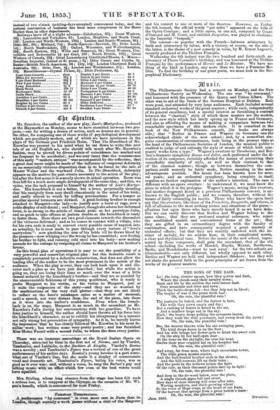Mr. Saunders, the author of 'the new play, Lore' s
.71fartyrdom, produced at the Haymarket on Monday, seems to have stumbled between two pro- jects,—one for writing a drama of action, such as dramas are in general; the other, for composing one of those works of psychological development which are peculiarly modern, and of which we have specimens in the plays of the German poet Fidedrich Halm. That The Hunchback of Mr. Knowles was present to his mind when he sat down to write this new tale of an old English set, who should talk much after Mr. Knowles's fashion, may be proved by divers points of coincidence too marked and too frequent to be accidental ; andwe may fancy that the reminiscence
of this early " modern antique" was accompanied by the reflection, that a great deal more might be made of the influence of corporeal deformity
on an essentially virtuous disposition than is to be found in the tale of Master Walter and the 'wayward Julia. In The Hunehback, deformity appears as the motive-fors past events necessary to the action of the play ; but after the first scene it is scarcely shown in actual operation. Room was thus left for a much more ample development of the same idea ' • and this, we opine, was the task proposed to himself by the author of Love Afartyr- dom. His hunchback is not a father, but a lover, perpetually dreading that his unsightly form may dwell obnoxiously in the 'mind of his bride, and easily stirred to wrath by trifling provocations. For a temper so peculiar special torments are devised. A good-looking brother is enough attached to Margaret—the lady—to justify now a burst of rage, now a noble display of self-denial ; and Margaret, though she adores her deformed lover, is as strong in the article of female pride as her prototype Julia, and as quick to take offence -at jealous doubts as the hunchback is ready to foster them. Here there are two good elements towards the discomfort of the virtuous deformed ; and as he comes in contact with a villain, who for his own ends is ready to convert every possible cause of anguish into an actuality, he is-soon made to pass through every torture of love's martyrdom": now pinching the arm of his bride till he draws blood by the pressure—now whining over the wrong he has committed ; now forcing his brother to fight, and running cold steel into his body—now making amends for the outrage by resigning all claims to Margaret in his brother's favour.
in this broad plan of operations it is easy to see the possibility of a very powerful and somewhat original play : but this desirable result is completely prevented by a defective construction, that does not allow the leading idea of the author to be the most-prominent in the minds of the audience. When the play is over, they can look back upon it and dis- cover such a plan as we have just described ; but while the action is going on, they are losing their time so much over the woes of a little damsel seduced.by the hunchback's brother—and they are so puzzled by the unaccountable fickleness of this young gentleman, who is ready to prefer Margaret to his victim, or his victim to Margaret, just as it suits the exigencies of the story—and they are so wearied by the machinations of the very dull plotter—that they are not likely to 'reflect on the hero's misshapen spine as a matter of moment, untila -speech, not very distant from the end of the piece, lets them as it were into the author's confidence. Even when the hunch- back is on the stage, Margaret -is as much in the ascendant as Mr. Knowles's Julia during her conversations with her guardian. To have done justice to himself, the author should have thrown all his force into the hunchback's character, so- as to exhibit his idiosyncracy in a manner not only strong but provocative of sympathy. As it is, he merely leaves the impression that he has closely followed 'Mr. Knowles in his most fa- miliar work ; has written some very pretty poetry ; and has furnished Miss -Helen 'Faucit with a -second Julia, to whom she does every justice.


























 Previous page
Previous page